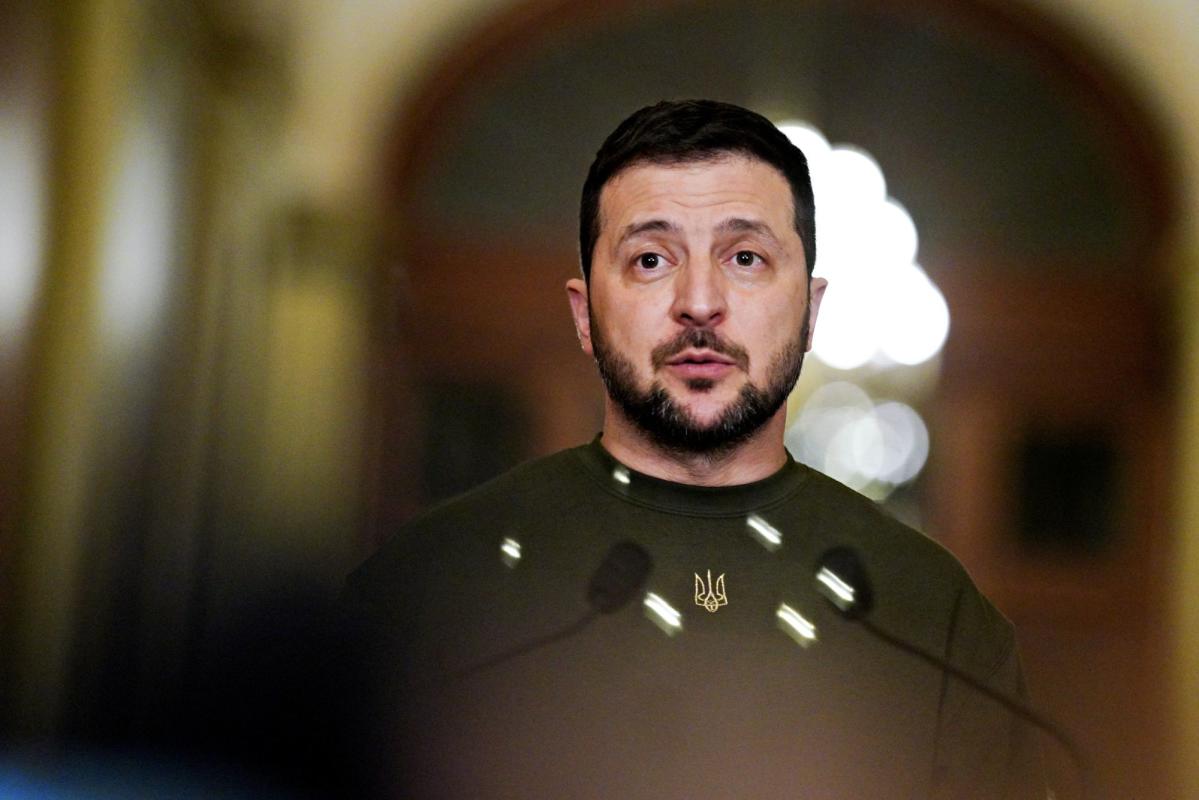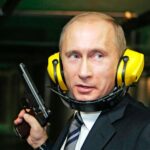
(Bloomberg) — Ukraine’s economy may grow next year, and this year’s inflation may be less than expected, according to the head of the central bank, who cited the nation’s resilience in the face of Russia’s campaign to destroy energy infrastructure.
Most Read from Bloomberg
Kyiv has seen a noticeable drop in enemy Air Force activity after a drone strike on a strategic-bomber base deep inside Russian territory on Monday, a military spokesman said. President Volodymyr Zelenskiy said Ukrainian troops are resisting Russia’s advances in intense fighting in the east and finding some opportunities to drive them out.
Russian Foreign Minister Sergei Lavrov said that Ukraine must comply with Moscow’s demands to surrender in full and concede sovereignty over annexed lands or face continued war. President Vladimir Putin also signed a decree banning the export of Russian oil and oil products to foreign buyers that adhere to a price cap on his country’s crude.
(See RSAN on the Bloomberg Terminal for the Russian Sanctions Dashboard.)
Key Developments
-
Putin Bans Selling Russian Oil to Price Cap Participants
-
Ukraine Resilience Helps Halt Economic Drop, Central Banker Says
-
Russia Says Ukraine Must Surrender Even as Putin’s Army Retreats
-
The AP Interview: Ukraine FM Aims for February Peace Summit
-
Three Die in New Drone Attack on Russian Strategic Bomber Base
On the Ground
Zelenskiy said in his overnight address that the most difficult areas of the front are near the towns of Bakhmut and Kreminna where Russia is pushing hard to make advances, and his office said he met with his commander in chief to discuss the situation. Russian forces, military equipment and weaponry are concentrated around Bakhmut, but efforts to encircle the town have been unsuccessful, Deputy Defense Minister Hanna Malyar said on television. Ukrainian troops repelled attacks near eight settlements in the eastern Donetsk and Luhansk regions, Ukraine’s General Staff said on Facebook.
(All times Central European Time)
Putin Bans Selling Russian Oil to Price Cap Participants (6:06 p.m.)
Putin banned the export of oil and oil products to foreign buyers that adhere to price caps imposed over his invasion of Ukraine, according to a decree.
The market has been waiting for Moscow’s response to the a $60-per-barrel cap since Dec. 5. when the Group of Seven nations’ limit on Russian seaborne crude exports came into force.
The restriction on Russian crude exports will begin on Feb. 1, while the starting date for the ban on oil products will come later. Putin’s decree didn’t list countries where Russian oil and oil products cannot be sold. The vast majority of the countries that imposed the cap have already halted purchases, suggesting the initial impact of the step may be limited in scope.
Read more here.
Kyiv Says Nuclear Plant Free Zone Should Exclude Russian Army (4:30 p.m.)
Ukraine’s position regarding the demilitarized zone at the Zaporizhzhia nuclear power plant remains the same: Russian troops and “Rosatom” should leave the station, Ukrainian Energy Minister Herman Halushchenko said during his meeting with G7 ambassadors on Tuesday.
“A fake management has been appointed there. They work without licenses and permits, Rosatom representatives are illegally staying at the plant,” Halushchenko said, adding that it’s also important to implement sanctions against Russia’s nuclear industry.
Ukraine Resilience Helps Halt Economic Drop, Pyshnyi Says (3:23 p.m.)
Ukrainians’ resilience is helping arrest a plunge in economic growth, and inflation is accelerating slower than expected, National Bank of Ukraine Governor Andriy Pyshnyi said in an interview.
Households and businesses have kept working and avoided spreading panic in the currency and banking markets, in a show of resistance as the war enters its 11th month. That may be enough for the economy to level off or grow slightly next year, after a contraction of more than 30% this year, Pyshnyi said.
Ukraine Says Almost 70 Iranian-Made Drones Downed in Past Two Weeks (2:06 p.m.)
Ukraine’s Air Defense shot down the single-use drones, which Russia used to attack Ukrainian infrastructure, spokesman Yuriy Ihnat said on television.
The Shahed-131 and Shahed-136 drones were part of a second shipment of 250 recently received by Russia, Ihnat said, without specifying where he got the information. Russia is also increasing its use of single-attack “Lancet” drones, mainly on the front lines, Ihnat said.
Ukraine Says Russian Air Force Activity Drops After Drone Strike (11:30 a.m.)
Ukraine has seen a significant decrease in Russian air force activity after a reported drone attack on the Engels strategic-bomber base in the Saratov region on Monday, Ukraine’s air defense force spokesman Yuriy Ihnat said on television.
Russia moved several of its planes from Engels to other air fields and even scaled back its tactical aviation operations around Ukraine, after strikes hundred of miles inside Russian territory, Ihnat said, without confirming Ukraine’s participation in the attacks.
Russia’s Defense Ministry said three military personnel were killed by the falling wreckage after a Ukrainian drone was shot down.
Ukraine’s Power Deficit Narrows, Ukrenergo Says (10:30 a.m.)
Electricity shortages in Ukraine narrowed slightly after a missile-damaged production unit at a thermal power plant was repaired and reconnected to the grid, national operator Ukrenergo said on its Telegram channel.
Demand from households and industry is still outpacing supply as access to the grid is restored after Russia’s repeated targeting of civilian infrastructure, according to Ukrenergo.
German Regulator Upbeat on Gas Supplies (8:15 a.m.)
Germany has been refilling gas storage facilities again for five straight days due to a combination of milder weather, increased power generation from wind and lower exports to neighboring France, according to the head of the country’s network regulator.
“Well-filled gas storage means security of supply for 2023” and for next winter, Federal Network Agency President Klaus Mueller said in a tweet. Germany has been forced to seek alternative supplies of gas after Russia halted deliveries, raising the prospect of rationing and power blackouts in Europe’s biggest economy.
Russia’s Lavrov Says Ukraine Must Surrender to End War (8 a.m.)
Lavrov said Ukraine must comply with Moscow’s demands for full surrender and concede sovereignty over lands annexed by President Vladimir Putin or face continued war.
In an interview with state news service Tass published early Tuesday, Lavrov reiterated calls for the “de-Nazification and de-militarization” of Ukraine that Putin had used as a justification to invade the neighboring country.
Russia in recent months had scaled back such calls, having failed to overthrow Zelenskiy’s government early on and after losing ground to Ukraine’s counteroffensives in the south and east.
Austria Warns of Blackout Threat to Europe (7 a.m.)
There is a “very high probability” that the European Union will be hit by widespread electricity blackouts in the near future due to Russian “hacking attacks,” according to Austrian Defense Minister Klaudia Tanner.
“The question is not whether it will happen but when,” Tanner was quoted as saying in an interview with Germany’s Welt newspaper. Russian “hacking attacks on western power supplies are a means of hybrid warfare,” she added. “We should not pretend that this is just theory. We must prepare for blackouts in Austria and in Europe.”
Ukraine Says 4,500 Cyberattacks Rebuffed (7 a.m.)
Ukraine has counteracted 4,500 cyberattacks from Russia against various targets, including government websites, data registers and infrastructure facilities, the head of the Security Service’s cyber security department, Ilya Vityuk, said on television. “Russia carries out up to 10 attacks every day, and massive missile attacks are always accompanied by cyber attacks,” Vityuk said. “But we learned to fight them off even in blackouts.”
Millions of Ukrainians Contend With Power Cuts (10:05 p.m.)
While Ukraine’s energy workers move to repair damage to the electricity system caused by recent Russian missile and drone attacks, almost nine million Ukrainians are still contending with power cuts, Zelenskiy said in his nightly address.
Earlier Monday, Ukrainian Energy Minister Herman Halushchenko said Russia has not given up its plans to launch further attacks on the nation’s energy facilities, with another round possible over the New Year holidays.
Most Read from Bloomberg Businessweek
©2022 Bloomberg L.P.




